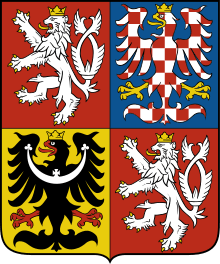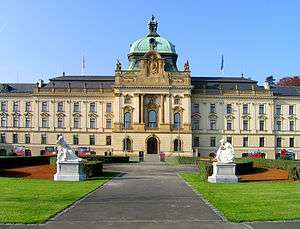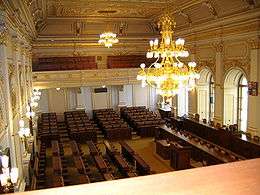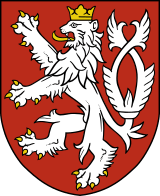Politics of the Czech Republic
The Czech Republic is a unitary parliamentary constitutional republic, in which the President is the head of state and the Prime Minister is the head of government.[1] Executive power is exercised by the Government of the Czech Republic which reports to the lower house of Parliament. The Legislature is bicameral, with the Chamber of Deputies (Poslanecká sněmovna) consisting of 200 members and the Senate (Senát) consisting of 81 members. Both houses together make up the Parliament of the Czech Republic.
 |
|---|
| This article is part of a series on the politics and government of the Czech Republic |
|
|
|
|
Executive |
|
The political system of the Czech Republic is a multi-party system. Since 1993, the two largest parties were the center-left Czech Social Democratic Party (ČSSD) and right-wing Civic Democratic Party (ODS). This model changed in early 2014, with the rise of a new political party ANO 2011 which led to weakening of both major parties. The Economist Intelligence Unit rated Czech Republic a "flawed democracy" in 2019.[2]

Political developments
The Czech political scene supports a broad spectrum of parties ranging from the Communist Party on the far left to various nationalistic parties on the far right.
Czech voters returned a split verdict in the June 2002 parliamentary elections, giving Social Democrats (ČSSD) and Communists majority, without any possibility to form a functioning government together due to Vladimír Špidla's strong anticommunism. The results produced a ČSSD coalition government with Christian Democrats (KDU-ČSL) and Liberals (US-DEU), while Civic Democrats (ODS) and Communists (KSČM) took place in opposition. The MP ratio was the tiniest 101:99. After many buffetings and, finally, after the catastrophic results of the June European Parliament election, 2004 Špidla resigned after a revolt in his own party and the government was reshuffled on the same basis.

As the system in the Czech Republic repeatedly produces very weak governments (a specific problem is that about 15% of the electorate support the Communists, who are shunned by all the other parties) there is constant talk about changing it but without much chance of really pushing the reform through. An attempt to increase majority elements by tweaking the system parameters (more smaller districts, d'Hondt method used) by ČSSD and ODS during their "opposition agreement" of 1998–2002 was vehemently opposed by smaller parties and blocked by the Constitutional Court as going too much against the constitution-stated proportional principle; only a moderated form was adopted. This, however, led to a stalemate in the 2006 elections where both the left and the right each gained exactly 100 seats; as many commentators point out, the earlier system would have given the right a 3–4 seat majority.
In March 2006, the parliament overturned a veto by President Václav Klaus, and the Czech Republic became the first former communist country in Europe to grant legal recognition to same-sex partnerships.
A government formed of a coalition of the ODS, KDU-ČSL, and the Green Party (SZ), and led by the leader of the ODS Mirek Topolánek finally succeeded in winning a vote of confidence on 19 January 2007. This was thanks to two members of the ČSSD, Miloš Melčák and Michal Pohanka, who abstained.
On 23 March 2009, the government of Mirek Topolánek lost a vote of no-confidence.
Executive branch
The President is the head of state, but the Prime Minister is the head of government.
| Office | Name | Party | Since |
|---|---|---|---|
| President | Miloš Zeman | Party of Civic Rights | 8 March 2013 |
| Prime Minister | Andrej Babiš | ANO 2011 | 6 December 2017 |
President
The President of the Czech Republic is elected by a direct vote (no more than two consecutive) for five years. The president is a formal head of state with limited specific powers.
Powers of President
- appoint and recall the Prime Minister and other members of the Government and accept their resignation, recall the Government and accept its resignation;
- convene sessions of the Chamber of Deputies;
- dissolve the Chamber of Deputies when specific conditions described in the constitution are met;
- pardon and mitigate penalties imposed by the court, order not to initiate criminal proceedings and suspend them if they are already initiated, and expunge sentences;
- have the right to return to theay delegate the negotiation of international treaties to the Government or, subject to the Government consent, to its individual members;
- be the Commander in Chief of the Armed Forces;
- appoint and recalls heads of diplomatic missions;
- call elections to the Chamber of Deputies and the Senate;
- appoint and promote generals;
- appoint judges
Prime Minister
The Prime Minister is the head of government and wields considerable powers, including the right to set the agenda for most foreign and domestic policies, mobilize the parliamentary majority, and choose governmental ministers.[3]

Cabinet
Cabinet of the Czech Republic is the supreme executive body in the Czech Republic. The Cabinet shall make its decisions as a body. The Cabinet shall consist of the Prime Minister and Ministers. Controls the state and the ministry. Publishes government decree. The Prime Minister shall be appointed by the President of the Republic who shall appoint on the Prime Minister's proposal the other members of the Cabinet and shall entrust them with the direction of individual ministries or other agencies. Within thirty days after its appointment, the Cabinet shall present itself to the Chamber of Deputies and shall ask it for a vote of confidence.
Legislative branch

The Parliament (Parlament České republiky) has two chambers. The Chamber of Deputies (Poslanecká sněmovna) has 200 members, elected for a four-year term by proportional representation with a 5% election threshold. There are 14 voting districts identical to the country's administrative regions. The Chamber of Deputies, at first the Czech National Council, has the powers and responsibilities of the now defunct federal parliament of the former Czechoslovakia.
The Senate (Senát) has 81 members, in single-seat constituencies elected by two-round runoff voting for a six-year term, with one third renewed every even year in the autumn. The first election was 1996 (for differing terms). This is patterned after the U.S. Senate but each constituency is of the (roughly) same size and the system used is two-round runoff voting. The Senate is unpopular among the public and suffers from low election turnout (overall roughly 30% in the first round, 20% in the second).
| Office | Name | Party | Since |
|---|---|---|---|
| Speaker of the Chamber of Deputies | Radek Vondráček | ANO 2011 | 22 November 2017 |
| President of the Senate | Miloš Vystrčil | Civic Democratic Party | 19 February 2020 |
Political parties and elections
| Party | Ideology | Votes | % | Seats | Change | ||
|---|---|---|---|---|---|---|---|
| ANO 2011 | Catch-all, Populism | 1,500,113 | 29.64 | 78 | +31 | ||
| Civic Democratic Party | Liberal conservatism, Euroscepticism | 572,962 | 11.32 | 25 | +9 | ||
| Czech Pirate Party | Pirate politics, Pro-Europeanism | 546,393 | 10.79 | 22 | +22 | ||
| Freedom and Direct Democracy | Direct democracy, Hard Euroscepticism | 538,574 | 10.64 | 22 | * | ||
| Communist Party of Bohemia and Moravia | Communism, Euroscepticism | 393,100 | 7.76 | 15 | -18 | ||
| Czech Social Democratic Party | Social democracy, Pro-Europeanism | 368,347 | 7.27 | 15 | −35 | ||
| Christian and Democratic Union – Czechoslovak People's Party | Christian democracy, Pro-Europeanism | 293,643 | 5.80 | 10 | -4 | ||
| TOP 09 | Liberal conservatism, Pro-Europeanism | 268,811 | 5.31 | 7 | -19 | ||
| Mayors and Independents | Localism, Pro-Europeanism | 262,157 | 5.18 | 6 | * | ||
| Party of Free Citizens | Right-libertarianism, Euroscepticism | 79,229 | 1.56 | 0 | 0 | ||
| Green Party | Green politics, Pro-Europeanism | 74,335 | 1.46 | 0 | 0 | ||
| Others | 0 | — | |||||
| Total (turnout 60.84%) | 5,060,759 | 100.00 | 200 | – | |||
| * Did not stand in previous election | |||||||
| Source: Czech Statistical Office | |||||||
| Party | Seats | ||||||||
|---|---|---|---|---|---|---|---|---|---|
| 2014 | 2016 [lower-alpha 1] | 2018 by [lower-alpha 2] | 2018 | 2019 by [lower-alpha 3] | TOTAL | ||||
| Civic Democratic Party | 2 | 3 | — | 10 | — | 15 | |||
| Christian and Democratic Union – Czechoslovak People's Party | 5 | 7 | — | 2 | — | 14 | |||
| Czech Social Democratic Party | 10 | 2 | — | 1 | — | 13 | |||
| Mayors and Independents | 1 | 3 | 1 | 5 | 1 | 11 | |||
| ANO 2011 | 4 | 3 | -1 | 1 | -1 | 6 | |||
| TOP 09 | — | 2 | — | 1 | — | 3 | |||
| Green Party | 2 | — | — | — | — | 2 | |||
| Senator 21 | — | — | 1 | 1 | — | 2 | |||
| Czech Pirate Party | — | — | — | 1 | — | 1 | |||
| Party of Civic Rights | 1 | 1 | -1 | — | — | 1 | |||
| Ostravak Movement | — | — | — | 1 | — | 1 | |||
| Freeholder Party of the Czech Republic | 1 | — | — | — | — | 1 | |||
| Mayors for Liberec Region | 1 | — | — | — | — | 1 | |||
| Communist Party of Bohemia and Moravia | — | — | — | — | — | — | |||
| Independents | — | 6 | — | 4 [lower-alpha 4] | — | 10 | |||
| Total | 27 | 27 | — | 27 | — | 81 | |||
Sources: Senate, Volby.cz, cs:Volby do Senátu Parlamentu České republiky 2014,
| |||||||||
Judicial branch
The country's highest court of appeals is the Supreme Court. The Constitutional Court, which rules on constitutional issues, is appointed by the president with Senate approval, and its 15 members serve 10-year terms. The justices of the Constitutional Court have a mandatory retirement age of 70. The Supreme Administrative Court is the third arm of the Czech judiciary.
Administrative divisions
The Czech Republic is divided in 14 Regions including the capital of Prague. The older 73 districts (okresy, singular: okres) and 4 municipalities* (města, singular: město) were disbanded in 1999 in an often-criticised administrative reform; however are still traditionally recognized and remain the seats of various branches of state administration: Benešov, Beroun, Blansko, Břeclav, Brno-město*, Brno-venkov, Bruntál, České Budějovice, Česká Lípa, Český Krumlov, Cheb, Chomutov, Chrudim, Děčín, Domažlice, Frýdek-Místek, Havlíčkův Brod, Hodonín, Hradec Králové, Jablonec nad Nisou, Jeseník, Jičín, Jihlava, Jindřichův Hradec, Karlovy Vary, Karviná, Kladno, Klatovy, Kolín, Kroměříž, Kutná Hora, Liberec, Litoměřice, Louny, Mělník, Mladá Boleslav, Most, Náchod, Nový Jičín, Nymburk, Olomouc, Opava, Ostrava*, Pardubice, Pelhřimov, Písek, Plzeň*, Plzeň-jih, Plzeň-sever, Prachatice, Praha*, Praha-východ, Praha-západ, Přerov, Příbram, Prostějov, Rakovník, Rokycany, Rychnov nad Kněžnou, Semily, Sokolov, Strakonice, Šumperk, Svitavy, Tábor, Tachov, Teplice, Trutnov, Třebíč, Uherské Hradiště, Ústí nad Labem, Ústí nad Orlicí, Vsetín, Vyškov, Žďár nad Sázavou, Zlín, Znojmo
International organization participation
The Czech Republic is member of Australia Group, BIS, CE, CEI, CERN, EAPC, EBRD, ECE, EU (among the 10 new members since May 2004), FAO, IAEA, IBRD, ICAO, ICRM, IDA, IEA (observer), IFC, IFRCS, ILO, IMF, IMO, Inmarsat, Intelsat, Interpol, IOC, IOM, ISO, ITU, ITUC, NATO, NEA, NSG, OAS (observer), OECD, OIF (Organisation Internationale de la Francophonie) (observer), OPCW, OSCE, PCA, PFP, UN, UNCTAD, UNESCO, UNIDO, UNMIK, UNMOP, UNMOT, UNOMIG, UPU, Visegrád group, WCO, WEU (associate), WFTU, WHO, WIPO, WMO, WToO, WTrO, Zangger Committee
References
- "Czech Republic | World news". the Guardian. Retrieved 4 October 2018.
- The Economist Intelligence Unit (8 January 2019). "Democracy Index 2019". Economist Intelligence Unit. Retrieved 13 January 2019.
- "Prime Minister | Government of the Czech Republic". www.vlada.cz. Retrieved 4 October 2018.
- http://www.mzv.cz/hague/en/general_information_on_the_czech/political_system/index.html
External links
- Constitution of the Czech Republic
- – website with results of all elections in Czech and English
- RZB Group: Czech Republic – Election 2006 Special
- Czech 2006 Election blog by the Prague Daily Monitor
- Erik Herron's Guide to Politics of East Central Europe and Eurasia
Government
- Official governmental website English
- Official presidential website English
- Official Senate website English
- Portal of the Public Administration Czech
- Chief of State and Cabinet Members CIA library on World leaders
